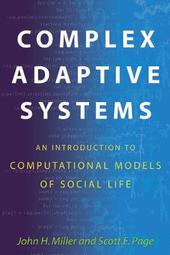
|
Complex Adaptive Systems: An Introduction to Computational Models of Social Life
Paperback / softback
Main Details
| Title |
Complex Adaptive Systems: An Introduction to Computational Models of Social Life
|
| Authors and Contributors |
By (author) John H. Miller
|
|
By (author) Scott Page
|
| Series | Princeton Studies in Complexity |
|---|
| Physical Properties |
| Format:Paperback / softback | | Pages:288 | | Dimensions(mm): Height 235,Width 152 |
|
| ISBN/Barcode |
9780691127026
|
| Classifications | Dewey:302.35072 |
|---|
| Audience | | Professional & Vocational | | Tertiary Education (US: College) | |
|---|
| Illustrations |
18 halftones. 16 line illus. 42 tables.
|
|
Publishing Details |
| Publisher |
Princeton University Press
|
| Imprint |
Princeton University Press
|
| Publication Date |
25 March 2007 |
| Publication Country |
United States
|
Description
Provides an account of complex adaptive social systems, by two of the field's leading authorities. This work focuses on the key tools and ideas that have emerged in the field since the mid-1990s, as well as the techniques needed to investigate such systems. It also demonstrates how the usual extremes used in modeling can be fruitfully transcended.
Author Biography
John H. Miller is professor of economics and social sciences at Carnegie Mellon University. Scott E. Page is professor of complex systems, political science, and economics at the University of Michigan. He is the author of "The Difference" (Princeton).
Reviews"The use of computational, especially agent-based, models has already shown its value in illuminating the study of economic and other social processes. Miller and Page have written an orientation to this field that is a model of motivation and insight, making clear the underlying thinking and illustrating it by varied and thoughtful examples. It conveys with remarkable clarity the essentials of the complex systems approach to the embarking researcher."-Kenneth J. Arrow, winner of the Nobel Prize in economics "In Complex Adaptive Systems, two masters of this burgeoning field provide a highly readable and novel restatement of the logic of social interactions, linking individually based micro processes to macrosocial outcomes, ranging from Adam Smith's invisible hand to Thomas Schelling's models of standing ovations. The book combines the vision of a new Santa Fe school of computational, social, and behavioral science with essential 'how to' advice for apprentice modelers."-Samuel Bowles, author of Microeconomics: Behavior, Institutions, Evolution "This is a wonderful book that will be read by graduate students, faculty, and policymakers. The authors write in an extraordinarily clear manner about topics that are very technical and difficult for many people. I sat down to begin thumbing through and found myself deeply engaged."-Elinor Ostrom, author of Understanding Institutional Diversity
|